Child Labour: Examining Arguments For and Against in Supply Chains
VerifiedAdded on 2022/11/28
|6
|1285
|260
Report
AI Summary
This report delves into the multifaceted issue of child labour, presenting a balanced analysis of arguments both for and against its banning, particularly within supply chains. The introduction defines child labour as the exploitation of children through work that hinders their development. The main body explores arguments for banning, emphasizing exploitation, child trafficking, and the need for children's rights to education and a standard life. It highlights how businesses exploit children for profit, expose them to harmful substances, and deny them fair wages. The report also examines arguments against banning, focusing on poverty, family support, and the potential for children to improve their lives through work. It acknowledges that child labour can be a means of survival for impoverished families and a path toward a better standard of living. The report concludes by summarizing the diverse perspectives and the complexities surrounding the issue, providing a comprehensive overview of the debate, supported by references to academic sources.
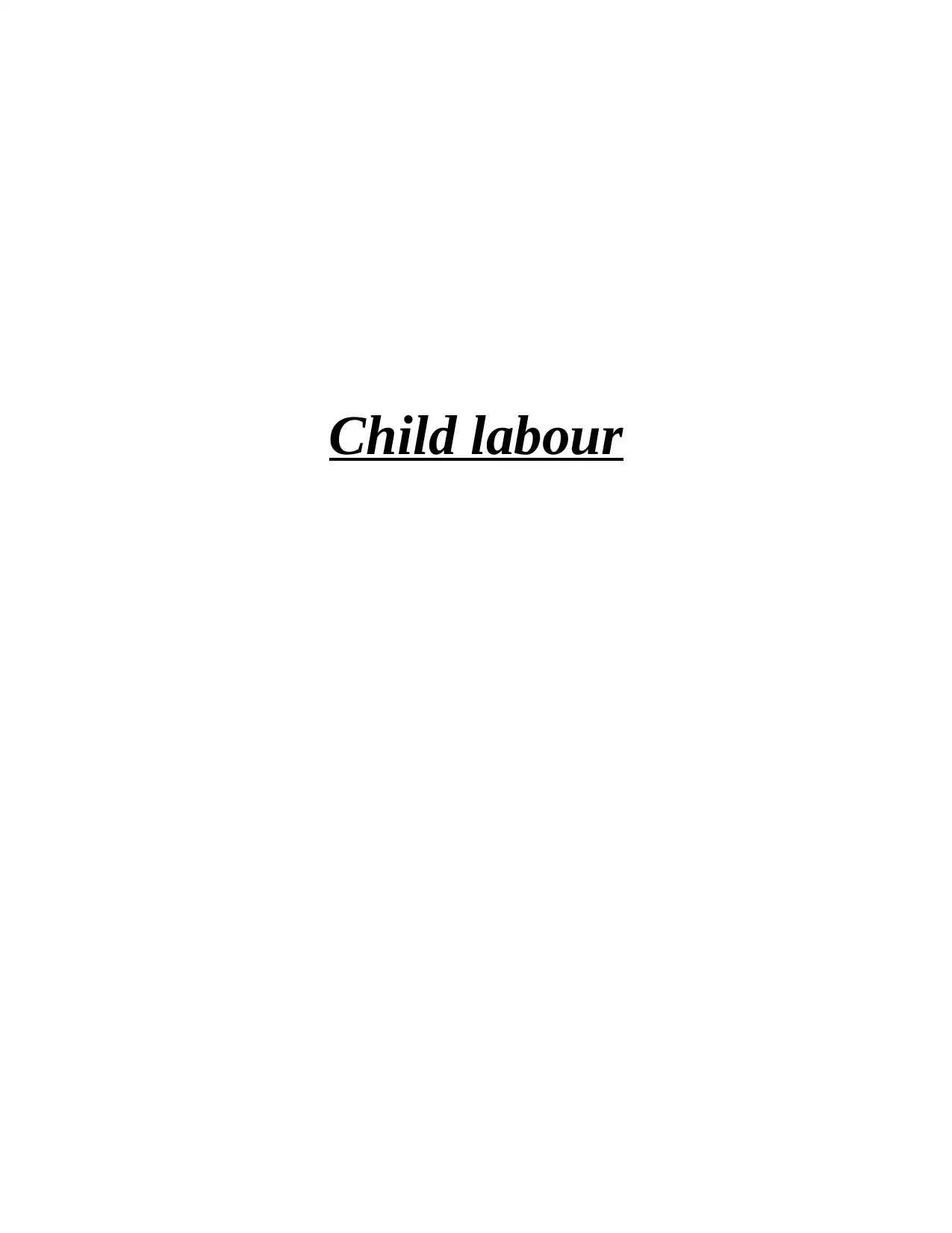
Child labour
Paraphrase This Document
Need a fresh take? Get an instant paraphrase of this document with our AI Paraphraser
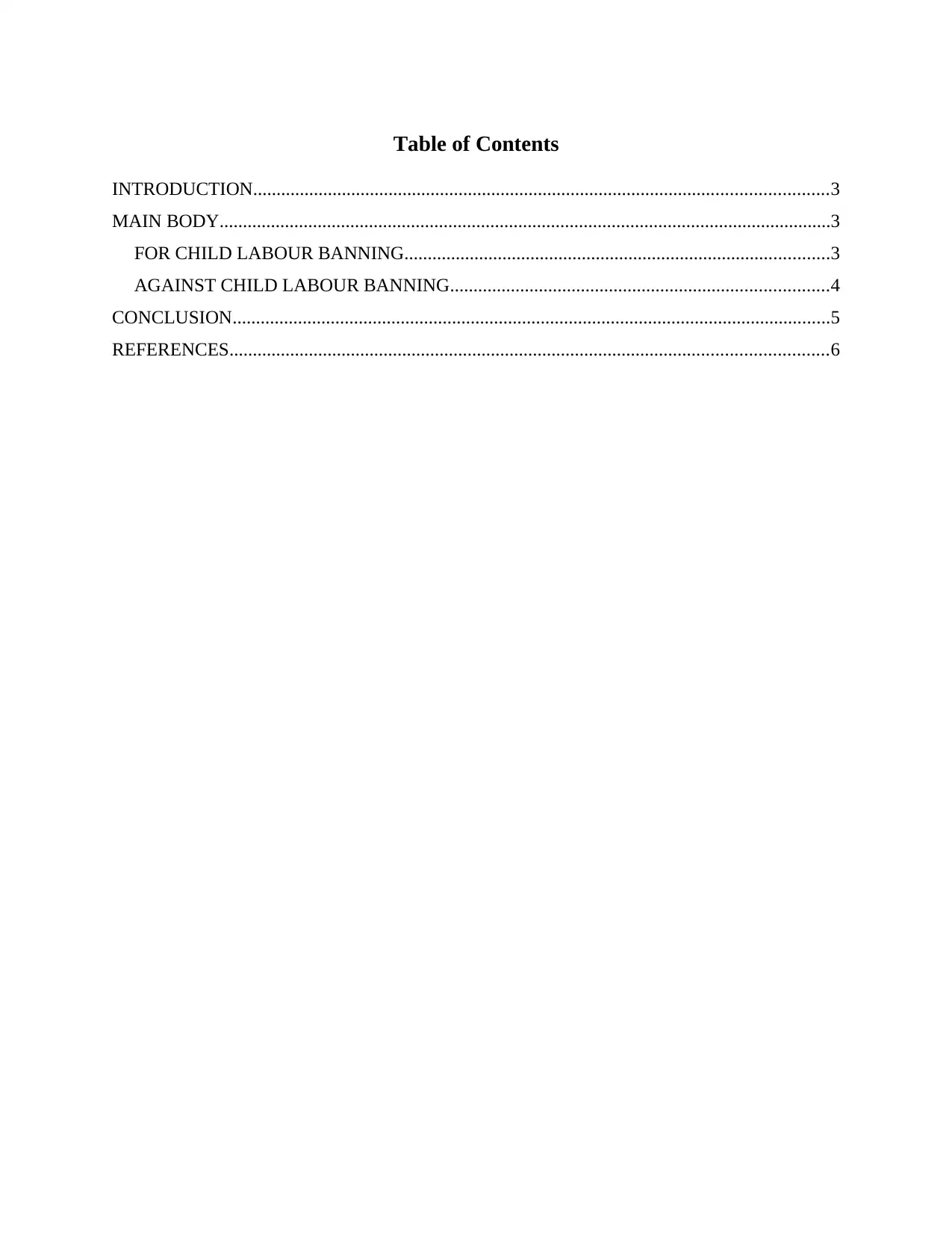
Table of Contents
INTRODUCTION...........................................................................................................................3
MAIN BODY...................................................................................................................................3
FOR CHILD LABOUR BANNING...........................................................................................3
AGAINST CHILD LABOUR BANNING.................................................................................4
CONCLUSION................................................................................................................................5
REFERENCES................................................................................................................................6
INTRODUCTION...........................................................................................................................3
MAIN BODY...................................................................................................................................3
FOR CHILD LABOUR BANNING...........................................................................................3
AGAINST CHILD LABOUR BANNING.................................................................................4
CONCLUSION................................................................................................................................5
REFERENCES................................................................................................................................6
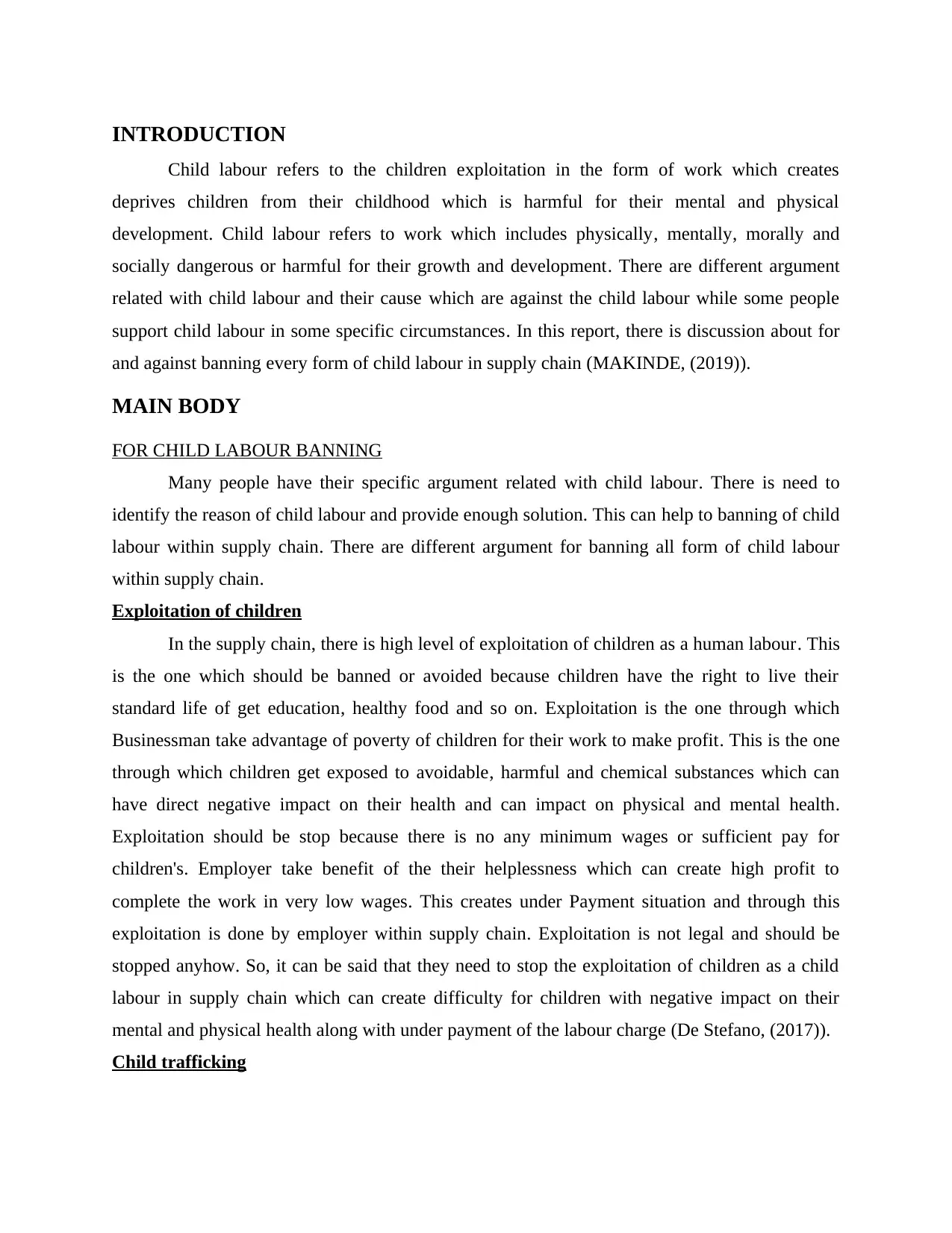
INTRODUCTION
Child labour refers to the children exploitation in the form of work which creates
deprives children from their childhood which is harmful for their mental and physical
development. Child labour refers to work which includes physically, mentally, morally and
socially dangerous or harmful for their growth and development. There are different argument
related with child labour and their cause which are against the child labour while some people
support child labour in some specific circumstances. In this report, there is discussion about for
and against banning every form of child labour in supply chain (MAKINDE, (2019)).
MAIN BODY
FOR CHILD LABOUR BANNING
Many people have their specific argument related with child labour. There is need to
identify the reason of child labour and provide enough solution. This can help to banning of child
labour within supply chain. There are different argument for banning all form of child labour
within supply chain.
Exploitation of children
In the supply chain, there is high level of exploitation of children as a human labour. This
is the one which should be banned or avoided because children have the right to live their
standard life of get education, healthy food and so on. Exploitation is the one through which
Businessman take advantage of poverty of children for their work to make profit. This is the one
through which children get exposed to avoidable, harmful and chemical substances which can
have direct negative impact on their health and can impact on physical and mental health.
Exploitation should be stop because there is no any minimum wages or sufficient pay for
children's. Employer take benefit of the their helplessness which can create high profit to
complete the work in very low wages. This creates under Payment situation and through this
exploitation is done by employer within supply chain. Exploitation is not legal and should be
stopped anyhow. So, it can be said that they need to stop the exploitation of children as a child
labour in supply chain which can create difficulty for children with negative impact on their
mental and physical health along with under payment of the labour charge (De Stefano, (2017)).
Child trafficking
Child labour refers to the children exploitation in the form of work which creates
deprives children from their childhood which is harmful for their mental and physical
development. Child labour refers to work which includes physically, mentally, morally and
socially dangerous or harmful for their growth and development. There are different argument
related with child labour and their cause which are against the child labour while some people
support child labour in some specific circumstances. In this report, there is discussion about for
and against banning every form of child labour in supply chain (MAKINDE, (2019)).
MAIN BODY
FOR CHILD LABOUR BANNING
Many people have their specific argument related with child labour. There is need to
identify the reason of child labour and provide enough solution. This can help to banning of child
labour within supply chain. There are different argument for banning all form of child labour
within supply chain.
Exploitation of children
In the supply chain, there is high level of exploitation of children as a human labour. This
is the one which should be banned or avoided because children have the right to live their
standard life of get education, healthy food and so on. Exploitation is the one through which
Businessman take advantage of poverty of children for their work to make profit. This is the one
through which children get exposed to avoidable, harmful and chemical substances which can
have direct negative impact on their health and can impact on physical and mental health.
Exploitation should be stop because there is no any minimum wages or sufficient pay for
children's. Employer take benefit of the their helplessness which can create high profit to
complete the work in very low wages. This creates under Payment situation and through this
exploitation is done by employer within supply chain. Exploitation is not legal and should be
stopped anyhow. So, it can be said that they need to stop the exploitation of children as a child
labour in supply chain which can create difficulty for children with negative impact on their
mental and physical health along with under payment of the labour charge (De Stefano, (2017)).
Child trafficking
⊘ This is a preview!⊘
Do you want full access?
Subscribe today to unlock all pages.

Trusted by 1+ million students worldwide
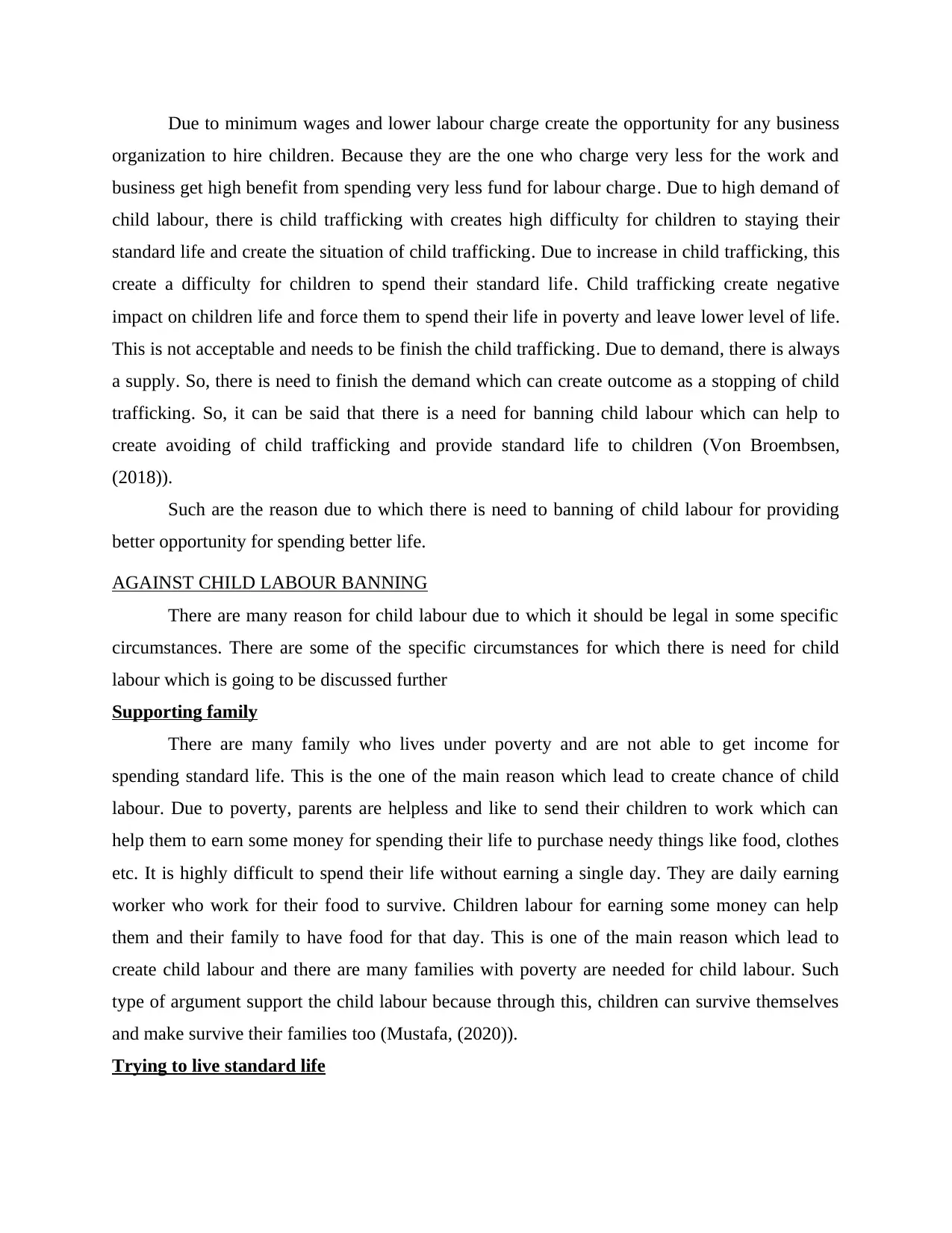
Due to minimum wages and lower labour charge create the opportunity for any business
organization to hire children. Because they are the one who charge very less for the work and
business get high benefit from spending very less fund for labour charge. Due to high demand of
child labour, there is child trafficking with creates high difficulty for children to staying their
standard life and create the situation of child trafficking. Due to increase in child trafficking, this
create a difficulty for children to spend their standard life. Child trafficking create negative
impact on children life and force them to spend their life in poverty and leave lower level of life.
This is not acceptable and needs to be finish the child trafficking. Due to demand, there is always
a supply. So, there is need to finish the demand which can create outcome as a stopping of child
trafficking. So, it can be said that there is a need for banning child labour which can help to
create avoiding of child trafficking and provide standard life to children (Von Broembsen,
(2018)).
Such are the reason due to which there is need to banning of child labour for providing
better opportunity for spending better life.
AGAINST CHILD LABOUR BANNING
There are many reason for child labour due to which it should be legal in some specific
circumstances. There are some of the specific circumstances for which there is need for child
labour which is going to be discussed further
Supporting family
There are many family who lives under poverty and are not able to get income for
spending standard life. This is the one of the main reason which lead to create chance of child
labour. Due to poverty, parents are helpless and like to send their children to work which can
help them to earn some money for spending their life to purchase needy things like food, clothes
etc. It is highly difficult to spend their life without earning a single day. They are daily earning
worker who work for their food to survive. Children labour for earning some money can help
them and their family to have food for that day. This is one of the main reason which lead to
create child labour and there are many families with poverty are needed for child labour. Such
type of argument support the child labour because through this, children can survive themselves
and make survive their families too (Mustafa, (2020)).
Trying to live standard life
organization to hire children. Because they are the one who charge very less for the work and
business get high benefit from spending very less fund for labour charge. Due to high demand of
child labour, there is child trafficking with creates high difficulty for children to staying their
standard life and create the situation of child trafficking. Due to increase in child trafficking, this
create a difficulty for children to spend their standard life. Child trafficking create negative
impact on children life and force them to spend their life in poverty and leave lower level of life.
This is not acceptable and needs to be finish the child trafficking. Due to demand, there is always
a supply. So, there is need to finish the demand which can create outcome as a stopping of child
trafficking. So, it can be said that there is a need for banning child labour which can help to
create avoiding of child trafficking and provide standard life to children (Von Broembsen,
(2018)).
Such are the reason due to which there is need to banning of child labour for providing
better opportunity for spending better life.
AGAINST CHILD LABOUR BANNING
There are many reason for child labour due to which it should be legal in some specific
circumstances. There are some of the specific circumstances for which there is need for child
labour which is going to be discussed further
Supporting family
There are many family who lives under poverty and are not able to get income for
spending standard life. This is the one of the main reason which lead to create chance of child
labour. Due to poverty, parents are helpless and like to send their children to work which can
help them to earn some money for spending their life to purchase needy things like food, clothes
etc. It is highly difficult to spend their life without earning a single day. They are daily earning
worker who work for their food to survive. Children labour for earning some money can help
them and their family to have food for that day. This is one of the main reason which lead to
create child labour and there are many families with poverty are needed for child labour. Such
type of argument support the child labour because through this, children can survive themselves
and make survive their families too (Mustafa, (2020)).
Trying to live standard life
Paraphrase This Document
Need a fresh take? Get an instant paraphrase of this document with our AI Paraphraser
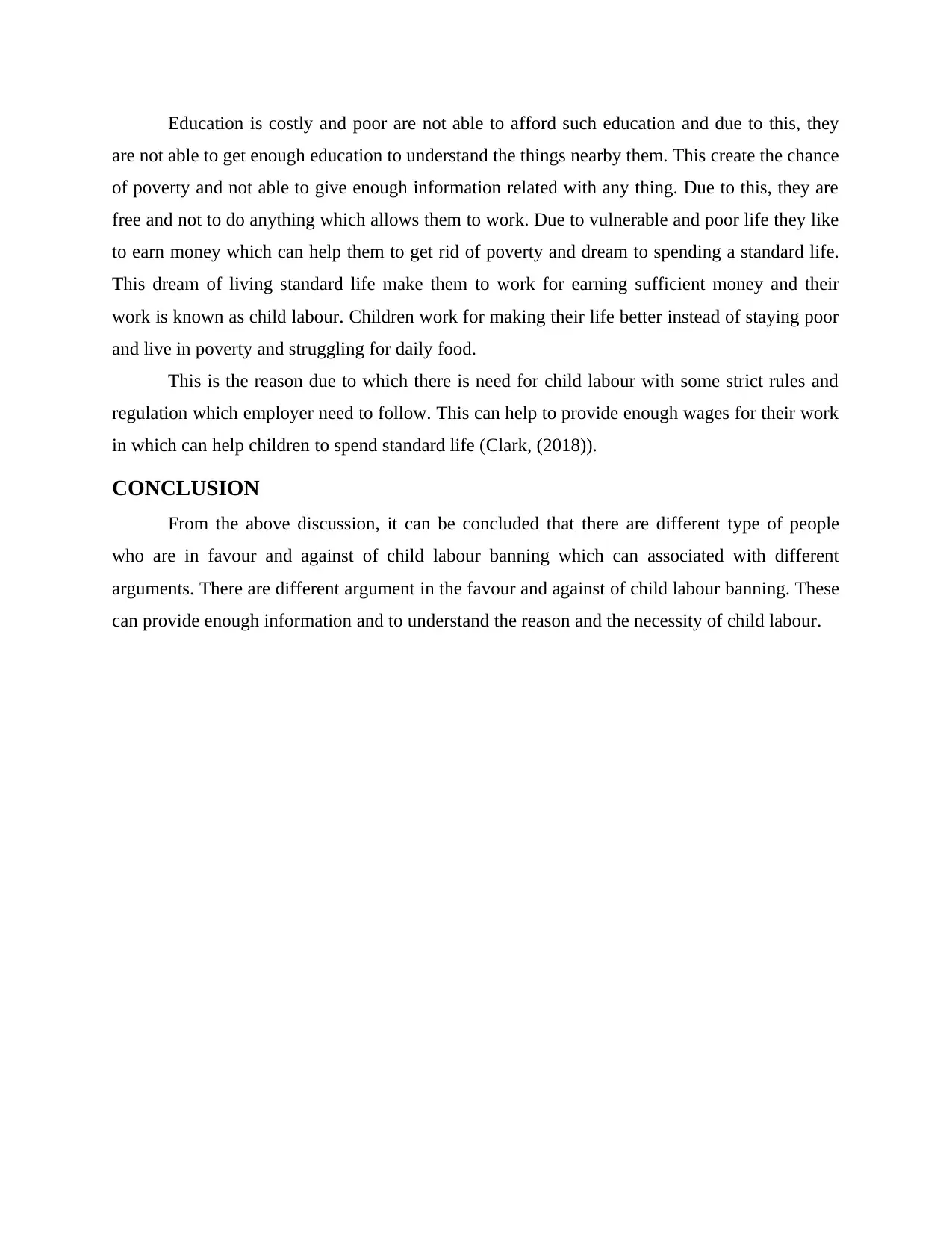
Education is costly and poor are not able to afford such education and due to this, they
are not able to get enough education to understand the things nearby them. This create the chance
of poverty and not able to give enough information related with any thing. Due to this, they are
free and not to do anything which allows them to work. Due to vulnerable and poor life they like
to earn money which can help them to get rid of poverty and dream to spending a standard life.
This dream of living standard life make them to work for earning sufficient money and their
work is known as child labour. Children work for making their life better instead of staying poor
and live in poverty and struggling for daily food.
This is the reason due to which there is need for child labour with some strict rules and
regulation which employer need to follow. This can help to provide enough wages for their work
in which can help children to spend standard life (Clark, (2018)).
CONCLUSION
From the above discussion, it can be concluded that there are different type of people
who are in favour and against of child labour banning which can associated with different
arguments. There are different argument in the favour and against of child labour banning. These
can provide enough information and to understand the reason and the necessity of child labour.
are not able to get enough education to understand the things nearby them. This create the chance
of poverty and not able to give enough information related with any thing. Due to this, they are
free and not to do anything which allows them to work. Due to vulnerable and poor life they like
to earn money which can help them to get rid of poverty and dream to spending a standard life.
This dream of living standard life make them to work for earning sufficient money and their
work is known as child labour. Children work for making their life better instead of staying poor
and live in poverty and struggling for daily food.
This is the reason due to which there is need for child labour with some strict rules and
regulation which employer need to follow. This can help to provide enough wages for their work
in which can help children to spend standard life (Clark, (2018)).
CONCLUSION
From the above discussion, it can be concluded that there are different type of people
who are in favour and against of child labour banning which can associated with different
arguments. There are different argument in the favour and against of child labour banning. These
can provide enough information and to understand the reason and the necessity of child labour.
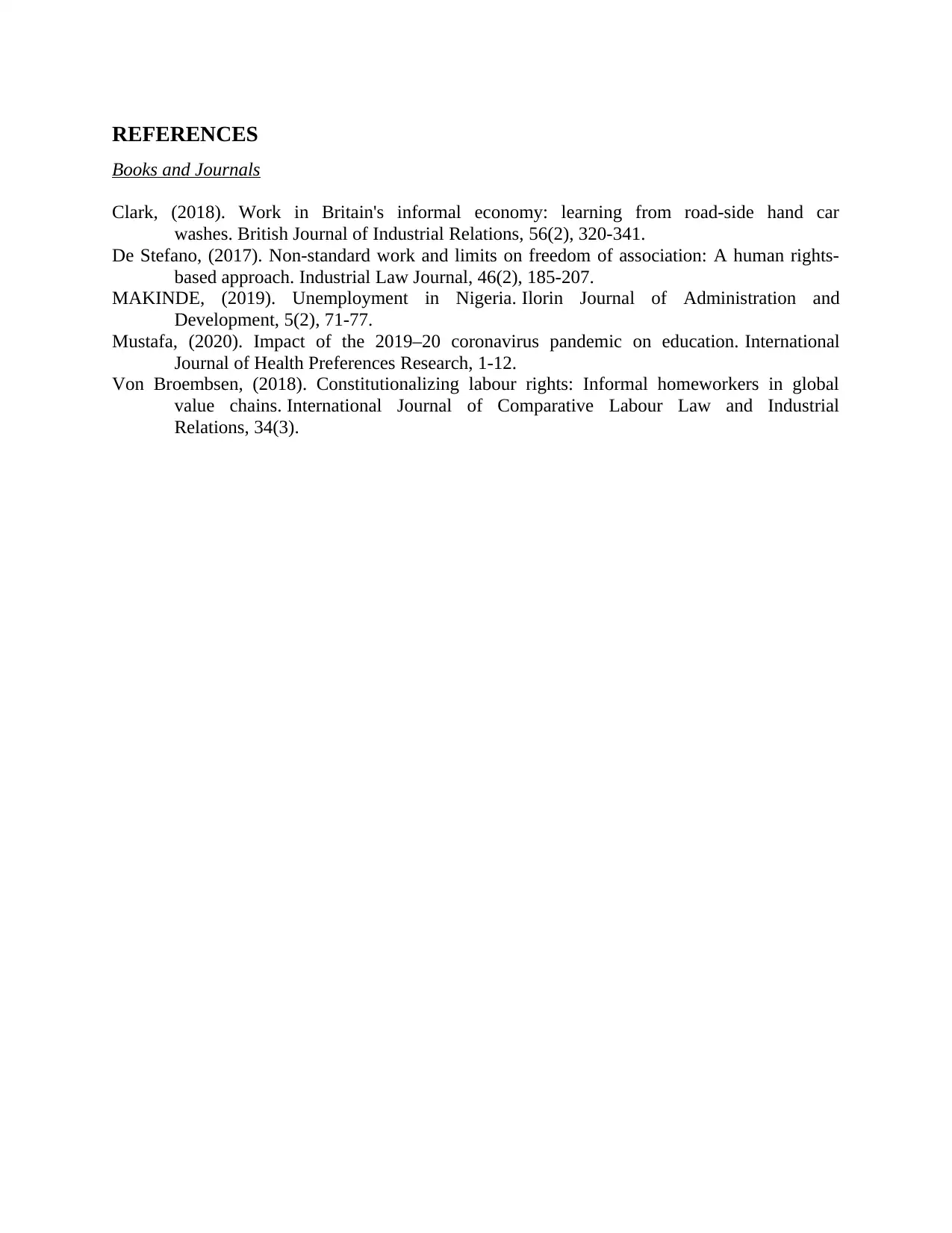
REFERENCES
Books and Journals
Clark, (2018). Work in Britain's informal economy: learning from road‐side hand car
washes. British Journal of Industrial Relations, 56(2), 320-341.
De Stefano, (2017). Non-standard work and limits on freedom of association: A human rights-
based approach. Industrial Law Journal, 46(2), 185-207.
MAKINDE, (2019). Unemployment in Nigeria. Ilorin Journal of Administration and
Development, 5(2), 71-77.
Mustafa, (2020). Impact of the 2019–20 coronavirus pandemic on education. International
Journal of Health Preferences Research, 1-12.
Von Broembsen, (2018). Constitutionalizing labour rights: Informal homeworkers in global
value chains. International Journal of Comparative Labour Law and Industrial
Relations, 34(3).
Books and Journals
Clark, (2018). Work in Britain's informal economy: learning from road‐side hand car
washes. British Journal of Industrial Relations, 56(2), 320-341.
De Stefano, (2017). Non-standard work and limits on freedom of association: A human rights-
based approach. Industrial Law Journal, 46(2), 185-207.
MAKINDE, (2019). Unemployment in Nigeria. Ilorin Journal of Administration and
Development, 5(2), 71-77.
Mustafa, (2020). Impact of the 2019–20 coronavirus pandemic on education. International
Journal of Health Preferences Research, 1-12.
Von Broembsen, (2018). Constitutionalizing labour rights: Informal homeworkers in global
value chains. International Journal of Comparative Labour Law and Industrial
Relations, 34(3).
⊘ This is a preview!⊘
Do you want full access?
Subscribe today to unlock all pages.

Trusted by 1+ million students worldwide
1 out of 6
Related Documents
Your All-in-One AI-Powered Toolkit for Academic Success.
+13062052269
info@desklib.com
Available 24*7 on WhatsApp / Email
![[object Object]](/_next/static/media/star-bottom.7253800d.svg)
Unlock your academic potential
Copyright © 2020–2026 A2Z Services. All Rights Reserved. Developed and managed by ZUCOL.





